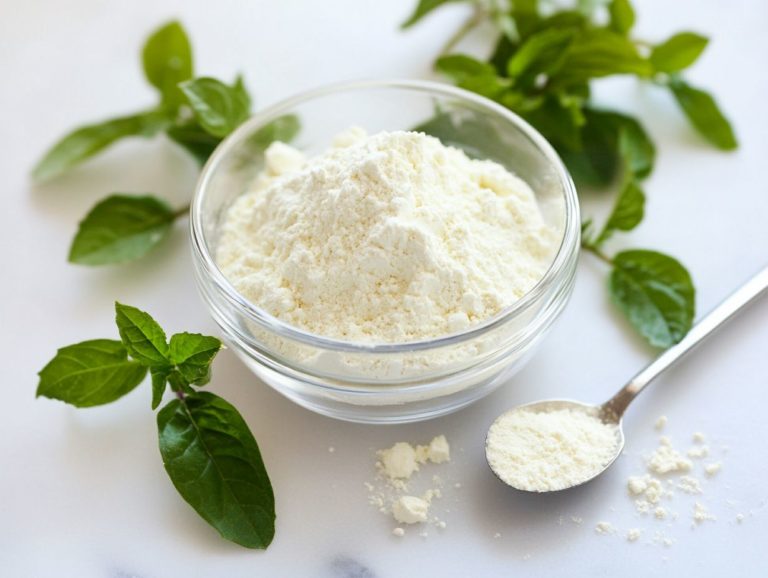The Role of Supplements in Mental Health
Mental health is intricately connected to various factors. Nutrition plays a pivotal role in your emotional and cognitive well-being.
This exploration delves into the relationship between your diet and your feelings. It sheds light on how specific vitamins, minerals, and herbal supplements influence mental health.
You’ll discover the benefits these supplements offer in enhancing mood and alleviating symptoms of mental disorders. We also provide guidance on selecting the right ones tailored to your needs.
Join us as you navigate the essential steps to incorporate nutrition and supplements into a comprehensive mental health treatment plan.
Contents
- Key Takeaways:
- The Connection Between Nutrition and Mental Health
- Types of Supplements for Mental Health
- Benefits of Supplements for Mental Health
- Reducing Symptoms of Mental Disorders
- Choosing the Right Supplements
- Factors to Consider
- Integrating Supplements into a Mental Health Treatment Plan
- Consulting with a Healthcare Professional
- Frequently Asked Questions
- How do supplements support mental health?
- How can supplements benefit mental health?
- Which supplements are commonly used for mental health?
- Are supplements a replacement for medication in treating mental health conditions?
- Can supplements have negative effects on mental health?
- How can I add supplements to my mental health plan?
Key Takeaways:

Nutrition is crucial for mental well-being. A balanced diet can greatly enhance your mental health.
Supplements can fill nutritional gaps, providing essential nutrients for mental support.
Herbal supplements like St. John’s Wort and Valerian can improve mood and reduce anxiety.
Consulting with a healthcare professional helps determine which supplements are appropriate and safe.
Incorporating supplements into a treatment plan can boost mood and cognitive function while reducing symptoms of mental disorders.
Consider dosage, interactions with medications, and potential side effects when choosing supplements for mental health.
The Connection Between Nutrition and Mental Health
Many researchers are exploring how nutrition affects mental health. Your dietary choices impact not just physical health but also mental well-being.
Essential components, such as vitamin supplements, omega-3 fatty acids from fish oil, and foods rich in nutrients, play a vital role in brain function and emotional stability.
As mental health disorders become more common, understanding this connection is crucial for effective treatment and dietary interventions.
Ongoing research highlights the impact of specific nutrients on neurotransmitter pathways. You can make informed choices to support a healthy nervous system and tackle mood disorders effectively.
Understanding the Impact of Diet on Mental Well-being
Understanding how diet influences mental well-being is crucial for addressing various mental health disorders like depression and anxiety, which often stem from nutritional deficiencies.
Recent studies show that a nutrient-rich diet enhances neurotransmitter function, particularly serotonin, which regulates mood.
Vitamins such as vitamin C are essential for physical health and promoting cognitive clarity and emotional balance. Vitamin D may improve mood and alleviate feelings of sadness. B vitamins are key in your body s production of serotonin.
By curating a balanced selection of these nutrients, you can optimize mental performance and build resilience against chronic mental health conditions. Nutrition is an invaluable ally in enhancing your psychological resilience.
Types of Supplements for Mental Health
A variety of supplements exists to support mental health. Each presents distinct benefits that can elevate overall well-being while addressing specific mental health concerns.
Vitamins and Minerals
Vitamins and minerals are vital for your mental health. Nutrients like vitamin C, vitamin D, zinc, and magnesium enhance cognitive function and emotional well-being.
These nutrients help your brain chemicals, which are essential for maintaining a stable mood and clear thinking.
For example, vitamin C, found in citrus fruits and leafy greens, is critical for making dopamine. This can boost your motivation and mood.
Vitamin D, mainly from sunlight and fortified foods, helps regulate serotonin, a neurotransmitter that alleviates feelings of sadness and anxiety.
Zinc and magnesium, found in nuts, seeds, and whole grains, help reduce oxidative stress in your brain.
Including these nutrients in your diet is crucial for optimal mental health and cognitive performance.
Amino Acids

Amino acids are the building blocks of proteins and play a crucial role in producing neurotransmitters that greatly impact your mood and cognitive health.
Some amino acids are essential for making serotonin, often called the ‘feel-good’ chemical.
Tryptophan serves as a precursor to serotonin and may help ease symptoms of anxiety and depression.
Tyrosine aids in producing dopamine and norepinephrine, which can uplift your mood and enhance motivation.
By incorporating amino acids into your diet, you can support your overall health and potentially boost your emotional resilience, offering a natural way to address mood disorders.
Herbal Supplements
Herbal supplements like saffron have gained attention for their mood-enhancing properties and potential benefits for mental health disorders.
These natural remedies can be appealing, especially as alternatives to traditional treatments for anxiety. Research shows that compounds in saffron can influence neurotransmitter activity, leading to a sense of calm and well-being.
Other herbs like ashwagandha and chamomile have also shown effectiveness in reducing stress levels through unique biochemical reactions.
Exploring these herbal options may reveal a holistic approach that tackles anxiety while bolstering your overall mental resilience.
Benefits of Supplements for Mental Health
The advantages of supplements for mental health extend beyond basic nutrient intake. They provide therapeutic effects that can significantly uplift your mood and enhance cognitive function, especially for those facing mental health challenges.
Improving Mood and Cognitive Function
Dietary supplements, particularly those rich in omega-3 fatty acids, can effectively support your mood and cognitive function by boosting serotonin production.
Research indicates that people who regularly consume omega-3s found in fatty fish and flaxseed oil experience lower anxiety levels and improved emotional well-being.
A notable study published in the Journal of Clinical Psychiatry revealed that participants who added omega-3s to their diets reported significant reductions in depressive symptoms.
Vitamins like the B-complex and minerals such as magnesium are also essential for brain health and mood regulation.
A comprehensive meta-analysis found that deficiencies in these nutrients were linked to diminished cognitive performance and increased mood disorders.
Incorporating these dietary components into your routine may lead to a remarkable boost in both mental clarity and overall emotional health.
Reducing Symptoms of Mental Disorders
Dietary supplements can significantly alleviate symptoms of mental disorders, acting as a valuable addition to traditional treatment methods.
For individuals dealing with conditions like depression and PTSD, certain supplements such as omega-3 fatty acids and St. John’s Wort may help ease symptoms. Omega-3 fatty acids are healthy fats that support brain function and mood. St. John’s Wort is also known for its antidepressant qualities, often leading to enhanced emotional resilience.
When you combine these supplements with lifestyle changes like regular exercise and a balanced diet, you may find a powerful synergy that helps you tackle mental health challenges effectively while boosting your overall well-being.
Choosing the Right Supplements

Selecting the ideal supplements for mental health is crucial and requires careful consideration of various factors.
You should assess your unique nutritional needs and dietary habits to make informed choices that truly support your well-being.
Factors to Consider
When considering supplements for mental health, keep several important factors in mind. Think about potential interactions with your medications and any recent lifestyle changes.
Review your personal health history, as certain conditions may make some supplements less suitable for you. It’s essential to consult healthcare professionals to gain valuable insights tailored to your needs.
To evaluate the quality and effectiveness of supplements, research reputable brands and look for certifications that confirm their potency and safety.
Understanding the ingredients and their proven effects allows you to make informed decisions, leading to a more effective strategy for enhancing your mental well-being.
Integrating Supplements into a Mental Health Treatment Plan
Working together with healthcare professionals to integrate supplements into your treatment plan can be a game-changer for your mental health journey!
This collaboration ensures both safety and efficacy, enabling you to make informed decisions about your well-being.
Consulting with a Healthcare Professional
It’s essential to consult a healthcare professional before considering dietary supplements as part of your mental health treatment plan. This helps ensure optimal treatment efficacy and safety.
Their expertise will guide you in selecting the right supplements tailored to your unique needs, helping to minimize the risk of negative interactions and side effects. Continuous monitoring of your progress is crucial; these professionals can assess how the supplements are impacting your mental well-being, allowing for necessary adjustments.
This proactive approach fosters a deeper understanding of your responses and enhances the overall effectiveness of your treatment strategy. With professional guidance, you can navigate your mental health journey with greater confidence and knowledge.
Frequently Asked Questions
How do supplements support mental health?

Supplements can play a supportive role in maintaining and improving mental health by providing necessary nutrients, but it’s also important to understand the role of a nourishing diet in mental health to promote a sense of well-being.
How can supplements benefit mental health?
Supplements can benefit mental health by providing essential vitamins and minerals, boosting neurotransmitter production, and supporting overall brain function. To dive deeper into this topic, you can explore the role of nutrition in mental health.
Which supplements are commonly used for mental health?
Commonly used supplements for mental health include omega-3 fatty acids, B vitamins, magnesium, and probiotics.
Are supplements a replacement for medication in treating mental health conditions?
No, supplements should not replace prescribed medication in treating mental health conditions. They can complement a treatment approach, but it is important to consult with a healthcare professional before making any changes to your treatment plan.
Don’t wait to explore how these supplements can support your mental health! Talk to your healthcare provider today about how supplements can enhance your mental well-being!
Can supplements have negative effects on mental health?
Some supplements can negatively impact mental health if taken in large doses or mixed with certain medications. Always follow the recommended dosage and talk to a healthcare professional before starting any new supplements.
How can I add supplements to my mental health plan?
Start by discussing with a healthcare professional to find out which supplements might help you. Remember, it s crucial to take the right amount. Maintaining a healthy diet and lifestyle alongside your supplements is also important.






